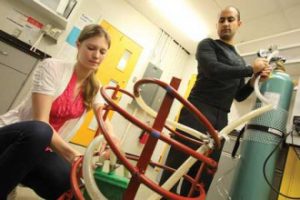
By Neale McDevitt
When Eyad Jamaleddine came to McGill as an Engineering undergrad four years ago, he wasn’t what you’d call a green warrior. “I had very little prior knowledge of the true severity of the environmental issues we faced,” he said.
Skip ahead to today, and Jamaleddine is the poster boy for ecological engineering, having just been named one of five recipients of the 2011 ECO Canada Student Awards recognizing the excellence in environment-related research being carried out by post-secondary students in Canada, and earning an invitation to present at the American Ecological Engineering Society’s annual conference in North Carolina in May.
The accolades are for Jamaleddine’s composting bioreactors project – a system he’s been working on for the past four years under the guidance of Grant Clark, a professor in the Department of Bioresource Engineering, and with the help of Cloé Rainville, another undergraduate student from the Department.
Efficient & cheap to build
Jamaleddine’s composting bioreactor is brilliant for its simplicity and efficiency – and its low cost. Comprised of a 200-litre plastic barrel, a heater core, copper tubing and a metal frame, the system is able to harness a compost bed’s natural heat – which can reach 70ºC in the thermophilic phase – and distribute it uniformly throughout the compost.
The uniform heat distribution eliminates those pockets of unprocessed banana peels and eggshells that are the bane many composting efforts. Simply put, material breaks down in a faster and more efficient fashion than with standard composting.
The final product is compost that is entirely cured and that has no pathogenic growth or organisms that are harmful to the environment or the humans manipulating it.. “The kicker,” said Jamaleddine, “is that the system requires no external inputs of energy and can be built for less than $30.”
On a larger scale, the composting bioreactors can also be used for bioremediation to remove heavy metals and other pathogens from contaminated soil. “Think Alberta Tar Sands,” said Jamaleddine. “Sure, mine is a small project in the grand scheme of things, but it has the potential to be used on a larger scale to help solve the bioremediation problem around the world.”
Hands-on experience
Jamaleddine is quick to praise the Department of Bioresource Engineering for giving him an opportunity unique to most undergrads – an opportunity that has effectively changed his entire outlook on the career he is working toward.
“Bioresource Engineering has allowed me to work on projects – hands on – throughout my undergraduate studies. Now I’m in the later stages of my degree and all this real life experience has made me a better engineer and one who is more environmentally conscious,” he said.
“My experience at McGill and within the Department has shown me that there are technological solutions to our environmental issues – solutions being worked on right here on the Macdonald Campus in bioremediation projects, climate change projects and other similar projects. Nothing could be more exciting for an undergraduate than to be involved with these types of initiatives.”
Once finished his degree, Jamaleddine wants to continue work on his composting bioreactor but on a larger scale as part of an MA, hoping to refine it so that it is a viable system for use in industry.
But, in the big picture, Jamaleddine wants nothing more than to do his part. “I think people in our Department share the desire to use engineering to serve mankind and protect the environment without limiting development,” he said. “We want to hand solutions to the next generations, not problems.”
